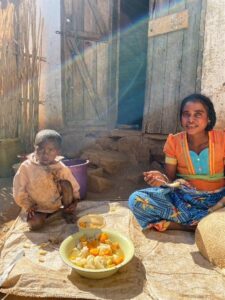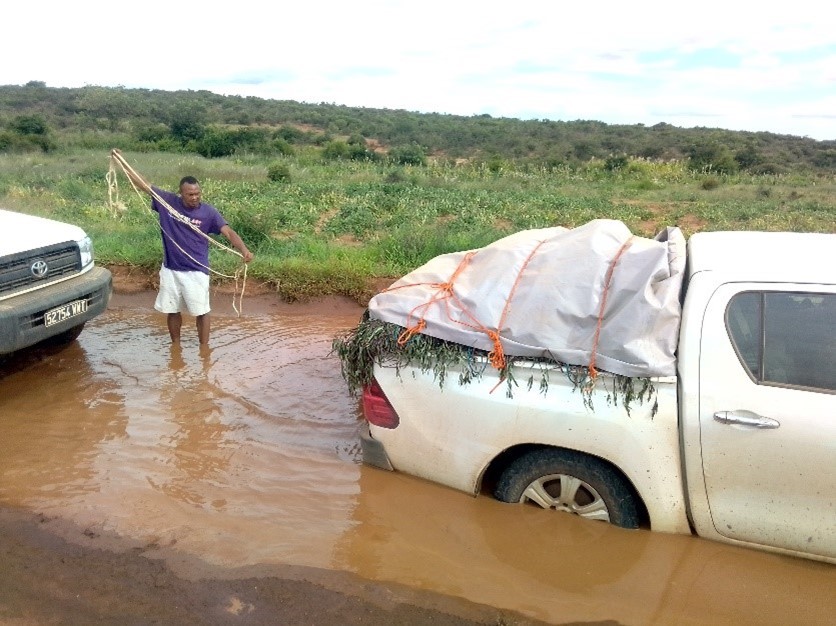After a four-year drought and repeated cycles of food crises that left hundreds of thousands of families grappling with malnutrition and food insecurity in Southern Madagascar, an orange-fleshed sweetpotato (OFSP) vine distribution initiative led by the International Potato Center (CIP) managed to reverse the trend in just 18 months surpassing the initial target.
Although widely known for its rich biodiversity and as a vacation paradise, Madagascar has also seen 70.7% of its population suffer from poverty, while 42% of children 6 to 49 months battle with chronic malnutrition.
Due to climate change, the island is regularly hit by natural disasters such as floods and drought. In the South, periods of food crisis and economic distress, generally referred to as “Kere” have become a regular pattern. After the sixteenth, and to recover from a four-year-long drought, the International Potato Center (CIP), together with other local partners, designed an innovative humanitarian intervention focusing on orange-fleshed sweetpotato as a powerful nutritional supplement and a durable response to malnutrition and food insecurity.
The orange-fleshed sweetpotato for health and wealth
The Sweet Recovery project developed by CIP and funded under the USAID Bureau for Humanitarian Affairs (BHA) covers nine districts in Southern Madagascar and was launched in 2022 to enhance food security and combat malnutrition in this drought-prone area.
In addition to training farmers in the production of quality planting materials, OFSP storage, and consumption, one of the key objectives of the project was the distribution of 4 kg of vines per household to approximately 80,000 households, prioritizing families with children diagnosed with malnutrition, young children, and pregnant or breastfeeding women.
More beneficiaries than expected

“Aren’t you too ambitious to target 80,000 households in only one year?” asked a USAID official during one of the field visits to CIP staff, vine multipliers, local community agents, and village leaders at the beginning of the intervention.
However, CIP and its partners took the daunting challenge by the horns and through a combination of detailed risk analysis, selection of dedicated staff, effective communication, and translation into local dialects. The project swiftly produced impressive results.
With the purchase and supply of equipment such as solar pumps and digital tablets, the Sweet Recovery Project improved the livelihoods of 58 vine multipliers. A delighted vine multiplier in Ampanihy, south-east of the Atsimo-Andrefana region, in south of Madagascar said: “We can now enjoy electricity at home, and the kids can even watch TV sometimes.”
The learning-by-doing approach during a series of trainings was fruitful. In fact, another vine multiplier in Betioky, from the centre-west of the Atsimo-Andrefana region, said: “I was hesitating to use the recommended high-density planting method, but now that I applied it, I am convinced and will never use the traditional technique anymore, not even on the local varieties of sweetpotato.”
Furthermore, about 348 local community agents were selected and trained on OFSP. They also received one tablet per pair for digital data collection, helping them to improve their practical skills in the digital era. This also increased their status in the community where only 9% of the beneficiaries have phones, and less than 2% have smartphones.
Beneficiaries reached with the distribution of OFSP vines exceeded 84,000 households as of June 2023 and the number will be even higher because a total of 91,000 households were registered to receive vines.
OFSP leaves and roots are expected to be sold and eaten in about 600 municipalities in Southern Madagascar.
A dedicated team in a challenging environment
None of the national roads, RN10 and RN13, serving the Southern region are paved and all the roads are in bad condition during the dry season. On average, riding 100 Km in a four-wheel car takes 5 hours.
“Yet, the most suitable moment to distribute vines is during the rainy, even cyclonic season, which is the worst time to travel by road,” said one humanitarian officer. “Our cars had to transport a total of 338 tons of vines with 0.5 to 1 ton per car, navigating through rocks, deep sand or mud, across the rivers, …. The vines needed to go to the beneficiaries at all costs, even if we had to use a deviation or to get help when stuck.”

CIP Agronomists were responsible for one district each, with an average of 9,000 beneficiaries of OFSP vines. They had to train 38 monthly-subsidized community agents and 6 vines providers each. In the field, the Agronomists were, at the same time: managers, technicians, human resources, logistics, finance, and administration staff of their respective districts.
Interestingly, the love story between the beneficiaries and OFSP is not over yet, as the second phase of the intervention is starting soon. For the next 18 months, beneficiaries will be trained in more topics for consolidation and development in the long term to make a difference and provide a lasting solution to the humanitarian situation in the South of Madagascar.
“We stand shoulder to shoulder with the communities we serve, no matter who, no matter where, and #NoMatterWhat.”
This activity was made possible through support provided by the Bureau for Humanitarian Assistance, U.S. Agency for International Development, under the terms of Award No. 720BHA22IO00005 The opinions expressed in this activity are those of the authors and do not necessarily reflect the views of the US Agency for International Development.
